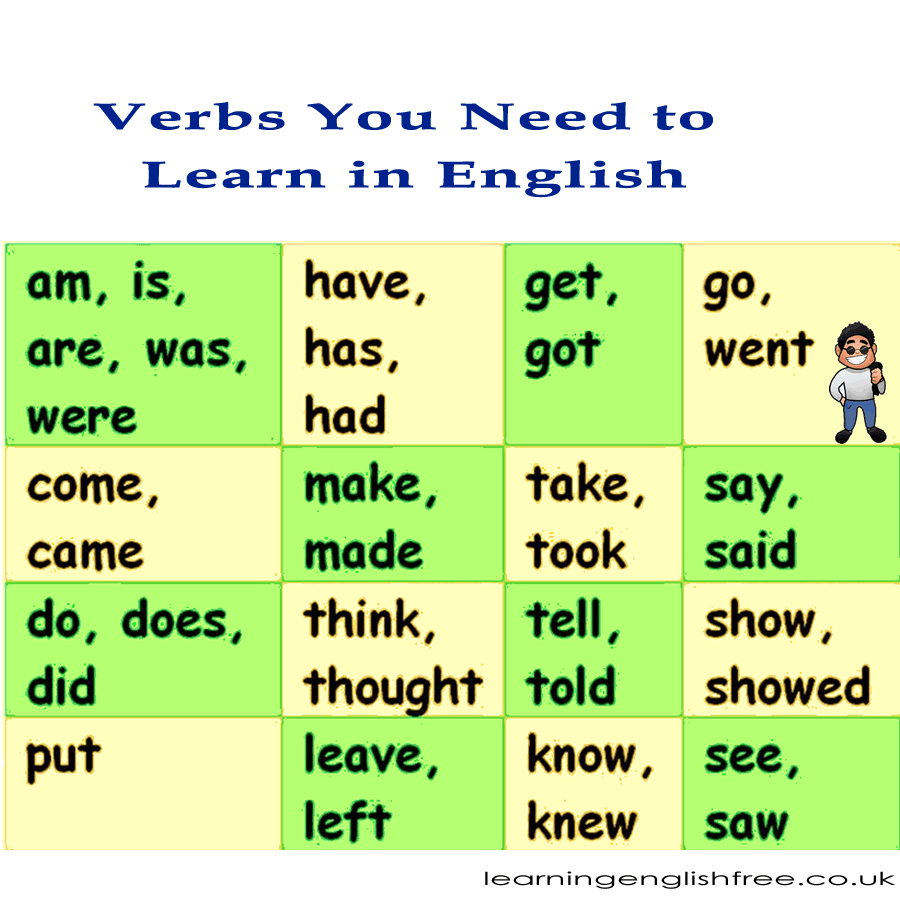Introduction to Essential English Verbs
Welcome to our insightful lesson on 'Verbs You Need to Learn in English'. Verbs are the action words in a sentence that tell us what the subject is doing. In this lesson, we will explore some of the most commonly used verbs in English. These verbs are foundational for constructing sentences, expressing actions, and conveying thoughts. Understanding and using these verbs will significantly enhance your ability to communicate effectively in English.
Learning Essential Verbs To learn these verbs effectively, it’s important to understand their meanings and how they are used in different tenses. Using these verbs in sentences about your daily life can be a practical way to memorise them. For example, you can say, 'I go to the park every day,' or 'Yesterday, I went to the park.' This practice helps in understanding the different forms of each verb and their uses in various contexts.
Tips for Remembering Key Verbs A great strategy for remembering these verbs is to associate them with actions you commonly do or see. Visual aids, such as pictures or flashcards, can also be helpful. Additionally, listening to and repeating sentences from English conversations or media that contain these verbs can reinforce your learning and comprehension.

Essential Verbs and Their Forms
-
To be (am, is, are, was, were)
- "I am happy" (present, first person singular).
- "He is tired" (present, third person singular).
- "They are at the party" (present, plural).
- "She was hungry" (past, third person singular).
- "We were excited" (past, plural).
-
To come (come, came)
- "She comes to school by bus" (present).
- "They came late yesterday" (past).
-
To do (do, does, did)
- "I do my homework" (present).
- "She does yoga" (present, third person singular).
- "He did the dishes" (past).
-
To put
- "Please put your books on the table" (present).
-
To have (have, has, had)
- "I have a cat" (present).
- "She has a question" (present, third person singular).
- "We had dinner" (past).
-
To make (make, made)
- "I make cakes" (present).
- "She made a card for me" (past).
-
To think (think, thought)
- "I think it’s a good idea" (present).
- "He thought it was funny" (past).
-
To leave (leave, left)
- "Please leave your shoes outside" (present).
- "She left early" (past).
-
To get (get, got)
- "I need to get some milk" (present).
- "He got a new job" (past).
-
To take (take, took)
- "I take a bus to work" (present).
- "She took her phone" (past).
-
To tell (tell, told)
- "Please tell me the story" (present).
- "He told a joke" (past).
-
To know (know, knew)
- "I know the answer" (present).
- "She knew about the event" (past).
-
To go (go, went)
- "We go to the beach every summer" (present).
- "They went home" (past).
-
To say (say, said)
- "Can you say it again?" (present).
- "She said it was great" (past).
-
To show (show, showed)
- "Please show me the picture" (present).
- "He showed us the way" (past).
-
To see (see, saw)
- "I see a bird" (present).
- "She saw a movie last night" (past).
Building a Strong Foundation in English Verbs
-
Key Takeaways In this lesson, you have learned about some of the most fundamental verbs in the English language. These verbs are the building blocks for forming sentences and expressing actions.
-
The Importance of Verbs Understanding these verbs and their different forms is crucial for effective communication in English. They are used in everyday conversation, writing, and various forms of media.
-
Practical Application Regular practice is essential. Try using these verbs in sentences and conversations daily to enhance your familiarity and fluency.
-
Further Learning Opportunities We encourage you to explore more lessons on our website to expand your understanding of English verbs and other aspects of the language.
-
Join Our Learning Community For more interactive content and support, visit us at www.facebook.com/learningenglishfree.co.uk. Share your progress, ask questions, and engage with fellow learners.
